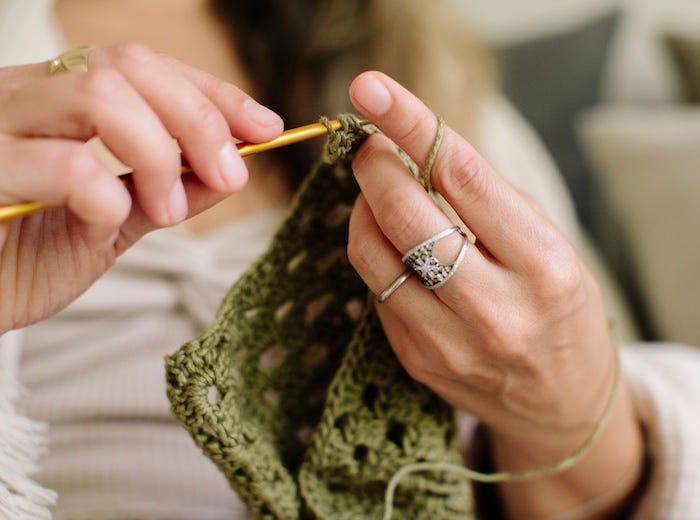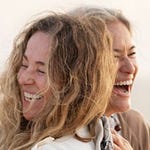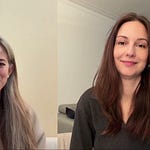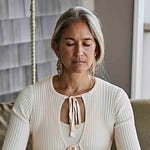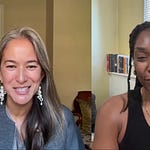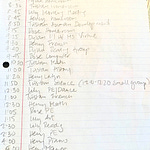There was a time when I didn’t know what I needed, didn’t know what I wanted, and honestly… didn’t feel much at all. I was tired—so tired I didn’t even realize it. I was numb—so numb that every day was just about putting one foot in front of the other.
But I still took care of business.
I spent years mastering the art of being useful. Then, out of nowhere, I discovered the quiet magic of doing something entirely pointless. And it brought me back to life.
A Small Favor (If You’re Up for It!)
Hey there! I’m so glad you landed here. This is real talk for real women.
My goal is just to say out loud what we’re all thinking. No script, no editing, no bullshit.
If you’re already part of Voicenotes From a Friend, thank you! If you’ve been enjoying it, please invite someone new into the fold—someone who could use a community of real, fun, and awesome friends.
In Case You Missed It:
Prefer To Read Instead Of Listen?
Transcript: I Was Feeling Numb. Then I Bought Yarn.
This is not really an advice-giving space, but if I were going to give people one piece of advice or one suggestion to try just for kicks, it would be to find a hobby.
And you know, I kind of think that likely the people listening to this are people like me: women in their 40s, and maybe they're mothers, and maybe they're busy and they've got a lot going on. And maybe they have spent a lot of time figuring out how to be really good at what they do, and there for other people, and they're incredibly effective and efficient and high-powered.
I mean, maybe that's my audience. I think it is these really, really high-powered women who are excellent at taking care of other people and understanding other people's needs, and maybe have not had a lot of time or energy spent on figuring out what they like to do.
So the question I always ask when I work with women is… or the questions I ask them to ask themselves are very simple but quite profound and powerful. And those questions are: How do I feel? What do I want? And what do I need?
And what's really interesting about those questions, at least for me when I first started this journey of self-exploration, was that when I asked myself those questions, I just had nothing. I was pretty numb for a long time. I was just… I was just running on empty.
You know, I had had five kids in six years. I had been pregnant, breastfeeding, or both for eight years straight. And I was—I was just getting through the day, going through the motions, and it left me feeling pretty numb. I think if you had asked me, “How do you feel?” I probably could have come up with “tired.” You know, like, I joke that I didn't sleep for a decade, but it's not a joke. I didn't sleep for a decade.
I think I was so tired I didn't even know I was tired. It was just this steady state of exhaustion that made every day blend into the next day. And so this question of: How do you feel? What do you need? And what do you want? was very confronting to me at that time. It was like, “What do I need? What do you mean, what do I need?” You know?
And I think that there was a part of me that felt like, even if I had needs, there was no chance they were being met. So it was much, much better and easier to not have any. To take all those needs and lock them in a box and put a chain around it and throw it to the bottom of the ocean. It’s like, “I don't need anything,” because who am I asking for these needs to be met?
I think that, actually, you know, the next generation is a little more aware of this. You know, when I was having kids, “self-care” wasn't a word. I remember early on having a self-care dinner, you know, where we were talking about the topic of self-care. And people were like, “What’s self-care?” Like, nobody had heard of it. Nobody was talking about it.
It seems so normal and normalized and in the conversation right now, but it was not. This idea of like, you actually have to take care of yourself or you're gonna have a big problem.
I remember, and I shared this story with a couple of people, and it ended up actually in a book, where I would describe to people the extent to which I had numbed the way I felt. And it extended to physical sensations. Not like, “How do you feel?” emotion-wise—like that I definitely didn’t know. Like, I didn’t even know how I felt in my body.
I would realize at the end of the day that I really had to pee like, painfully. You know what it feels like when you really have to pee, like it hurts. Like your body is like, “Hello? Attend to me.” And what I realized was it wasn't even like I had felt the physical sensation and I had been like, “I don't have time. I gotta, you know, change diapers or pick this up or bring my kid to here.” I actually, literally, physically blocked out the sensation. Like, I didn't feel it and decide to ignore it. I didn’t even feel the physical sensation until it was so intense that I was running to the bathroom.
So this really, really interesting dynamic of becoming so good at overriding how you feel and overriding what you need.
And then the hardest question of all. I ask people this question, and they're like, “Vanessa, no, not that one.” Like, “What do you want?” What do you want? That's super confronting when we've trained ourselves not to want. That what we prefer and what we like is not even on the table, because our job is to take care of and serve and make sure everyone else is okay.
Now, I'm sure this isn't everybody, but this is definitely a common, common sort of pattern of training that I have observed in the women that I work with and in myself.
And so I know where we started was “get a hobby.” But what's the point?
The point is: a hobby is really, really fascinating and wonderful because the point of a hobby is that you just enjoy doing it. It's kind of inherently unproductive. If you know me, I've got a bunch of hobbies that I've developed recently. I'm obsessed with my hobbies. I love them so much, and I'm trying to get all my friends obsessed with them too, so I can do them with my friends all the time.
So I'm really into crochet and kind of all stitching. Like, I love needlepoint and crochet and knitting. I'm really into natural perfumery. I'm really into surfing. But this is all recent, recent developments.
So the point of the hobby is that you just like it. Because you like it. You just enjoy it. And what's interesting is, nobody can tell you what you like. You actually have to tap into that place and say, “Do I even like doing this? Do I enjoy it?”
And sometimes you have to try different things. You know, like, I would not say you have to find the thing you love to try a hobby or to try something. It's like, just try it. Like, what's the downside? Check it out. See if you enjoy it.
And then the other thing I love about a hobby is it's inherently unproductive. It inherently makes you tap into what you like, and it's inherently unproductive. Because, boy, have we been trained that our worth is tied up in our productivity. That our value is tied up in what we can do, achieve, accomplish, produce.
So I love wasting time on my hobby just because I like it and I enjoy it. It's so simple, but to me, it's pretty rebellious. It's pretty rebellious for those of us who have been really trained to not tune into our preferences, not tune into what we like, to really tune into what other people want, and to be really achievement-oriented.
So it's like, oh no, there's a third thing. There's a third thing that I love about a hobby. I love that it tunes you into what you like. You gotta really figure out what you like. No one can tell you. I love that it's unproductive. And I love that when you start, you're bad at it.
I don't know about you, but I really don't like to be bad at things. I really don't enjoy being bad at things. But I've gotten better at enjoying being bad at things because the stakes are so low. I love how low the stakes are.
If you learn to knit and you've got holes in your knitting—well, first of all, you might learn things about yourself through those holes in the knitting. I have definitely learned things about myself when I see a mistake, and I sit there and I decide, “Am I going to leave the mistake, or am I going to undo, you know, the last—I don't know—two hours of work to fix the mistake?”
Oof. I don't know about you, but I have left the mistake, but it has been hard. I know it seems silly and unimportant… not unimportant… for me to leave the mistake and be like, “I will forever know there is a mistake in my shawl.” And that is good. It is good for me to see it, to know it, to wear it, knowing that. A mistake there.
So we do learn a lot about ourselves through these processes. And by the way, it's just fun. It's just fun, right? Like, if you pick a hobby that you enjoy, there's just the fun factor. And then there's the rope-your-friends-in factor, which means you can be—sometimes, hopefully—in community when you do the things that you're doing for fun.
And so I think… I think fun is always a good thing. And we think that getting a hobby isn’t important or potentially transformative. But I think it might be. I think it might be, especially for those of us who have a hard time accessing the right to joy in our lives.
So yeah. Find a hobby. Try something new. I challenge you to try something new.
I highly recommend knitting and crocheting. You could try it and be like, “Vanessa, out of your mind. I hate it.” Totally fine. I get it. Not for everybody. But I do love it, and it's given me so much, and I enjoy it so much. And, yeah, maybe give it a try.
Thanks, as always, for being with me. All my love.




